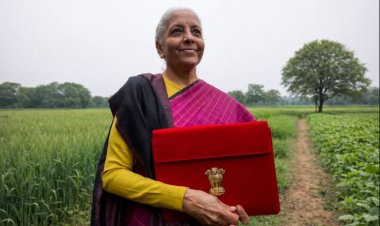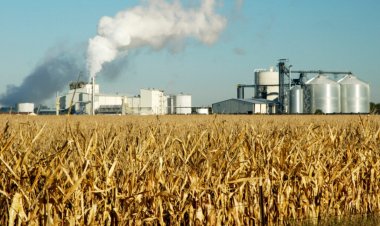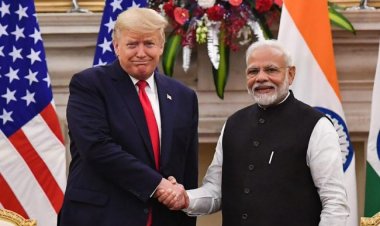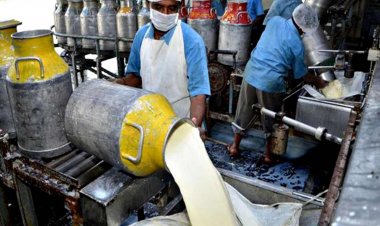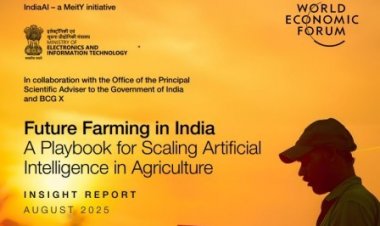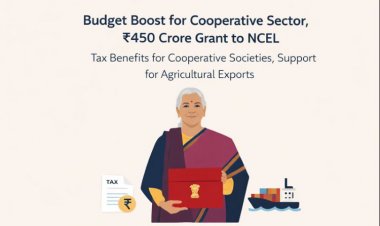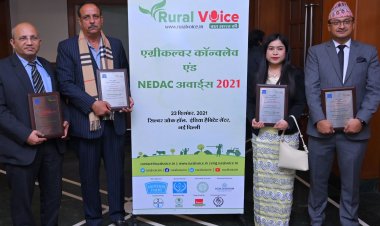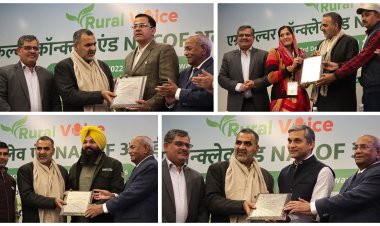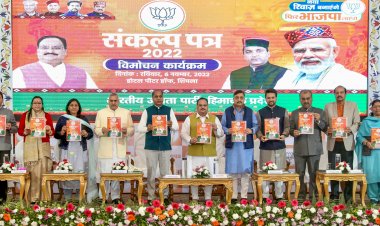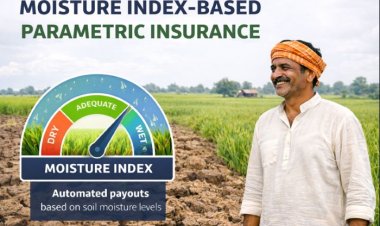From ‘food security’ to ‘nutrition security’ and much more
The National Dialogue is an exchange of ideas among Niti Aayog, Food and Agriculture Organisation and the government to transform agriculture in India with a decade-long view.
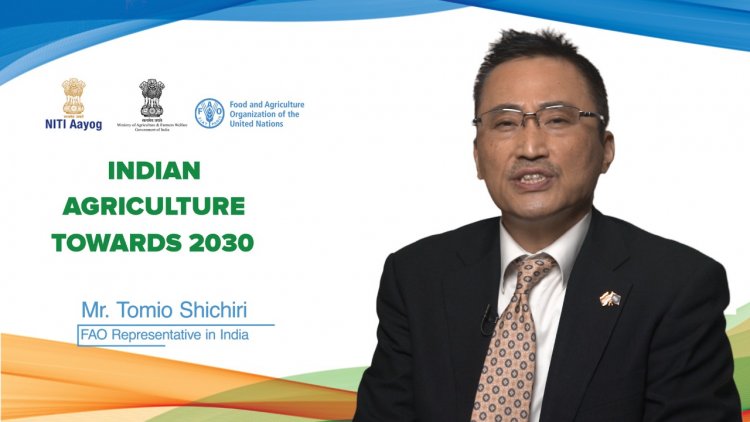
The National Dialogue is an exchange of ideas among Niti Aayog, Food and Agriculture Organisation and the government to transform agriculture in India with a decade-long view. In the virtual conference held this year 19-22 Jan, deliberations were held on eight themes.
The post-Covid-19 scenario calls for an enhanced technological approach. In order to tackle pest pandemics, a ‘One Health’ approach was suggested. It was felt that agricultural transformation needs to go beyond a growth-centric approach. One of the papers on agroecology talked of going beyond science and emphasized collective action. Certain structural reforms — rationalization of schemes and subsidies; shift from input support to income support — were recommended. Also, the impact of climate change needs to be comprehensively looked into. The seriousness of water-related stress issues and structural shifts needed in dietary patterns were the other concerns.
EVENT
The National Dialogue, Virtual Conference was inaugurated by the Hon’ble Vice President Shri M. Venkaiah Naidu on the 19 January 2021. He emphasized that agriculture is the pillar of India’s ecology, culture and civilisation. He reinforced the calls for changing focus from ‘food security’ to ‘nutrition security’. In his words, the lab-to-land concept has to be effectively implemented.
Across the following three days 20-22 January, the National Dialogue has had a healthy exchange of views among all stakeholders to facilitate a transformative shift in India’s agriculture. Deliberations were held on eight themes; discussion papers were authored by some of the brightest minds on the subjects in India. These key thematic areas were identified collaboratively between NITI Aayog, MoA&FW, and FAO, under the overall guidance of a Steering Committee.
19 January 2021:
On 19 January during the Overview Session, of the National Dialogue, the discussants led by Professor Ramesh Chand, Member, NITI Aayog deliberated on the rationale for the foundational change required in Indian agriculture. Emphasizing the three aspects of sustainability (environment, social and economic) Prof. Chand said that there is an increasing mismatch between consumption diversification and production diversification. He encouraged that cropping systems and farming systems should be better suited for small and marginal farmers. Mr Maximo Torero Cullen, FAO Chief Economist highlighted the challenges to Agriculture in a Post-COVID world. In this context he emphasized that innovation is not only about technology, but also about process.
This session pointed towards the policy changes required to reorienting India’s food and farming system from focusing on mere production to enhancing farmers’ incomes, ensuring nutritional security and ecological sustainability. In this session, Dr Ashok Dalwai, CEO National Rainfed Area Authority (NRAA) stressed the need to shift from the supply side model to the demand side and from a farmer’s perspective to adopt agricultural value systems that integrate value chains and move the system to a higher equilibrium, therefore fetching higher returns to the farmers.
20 January 2021:
The themes of discussion were; Transforming Indian Agriculture; Pest Pandemics, Preparedness and Bio-security; Natural Farming, Agro ecological and Biodiverse Futures.
The paper presented by Dr Ashok Gulati and Ms Ritika Juneja, Indian Council for Research on International Economic Relations (ICRIER), discussed the trajectory of agricultural transformation using different indicators to discuss the likely path of transformation for Indian agriculture. The authors acknowledged that resource use intensification, which gave India the much needed food, feed and fibre security, also had unintended negative environmental consequences. However, there are several mitigative measures and innovations that need to be scaled up. They encouraged the policies to be biased towards high value agricultural commodity production rather than cereal production while prioritizing resource use efficiency and ensuring nutrition security using the food systems approach. The discussants flagged the need for a new measurement matrix to gauge the success of agriculture. So far agriculture is only seen through the indicator of growth.
In the second session on the day, the entomologist Dr N K Krishna Kumar and Dr S Vennila, Indian Council of Agricultural Research (ICAR) presented their paper which explores new and emerging challenges confronting Indian agriculture, given the pandemic, desert locust attacks, avian influenza and other natural disasters. Highlighting the socio-economic and ecological concerns of pests and pandemics, especially aggravated by climate change and the globalized settings, the thematic presenters underlined the need for strong inter and intra institutional coordination; enhanced quarantine infrastructure and epidemiology research; trans-boundary cooperation; and strengthened database and monitoring; under the overall guidance of the holistic ‘One Health’ approach.
In the final session of the day Mr Vijay Kumar, RySS, Andra Pradesh Community Managed Natural Farming, Ex Officio Chief Secretary to the Government of Andhra Pradesh, and Dr Ravi Prabhu, Director Innovation, Investment and Impact, World Agroforestry discussed presented their paper on Natural Farming, Agroecological and Biodiverse Futures. In this paper the authors delved deeper into understanding the value proposition of agroecology and natural farming systems, and its potential to meet the challenges of food and nutritional security, achieve optimal efficacy in natural resource exploitation, integrate technology and innovation, augment climate resilience and guarantee economic viability. Mr Kumar said, that the transformation of agriculture is a matter of changing the mindsets, attitude and behavior of people and not just the use of science. It will require involving all value chain actors especially farmers in the process as equal partners. He highlighted that the women led SHGs play an important role as demonstrated in Andhra Pradesh to promote knowledge exchange, and collective action.
21 January 2021:
The themes of discussion on the day were, Structural Reforms and Governance; Climate Change and Risk Management; and Water in Agriculture.
In the first session, the paper presented by Dr Seema Bathla of Jawaharlal Nehru University and Mr Siraj Hussain of Indian Council for Research on International Economic Relations (ICRIER), discussed the role of structural reforms and governance issues for transformation of agriculture sector and provide pathways for reforming policies and institutions for a sustainable and resilient agriculture and food systems. The discussion that followed suggested that schemes and subsidies need to be rationalized curtail fiscal burdens. There is a need to shift from input support to income support. Investment in R&D has shown the highest returns and needs more focus. The issue of Governance needs greater focus both for agricultural inputs as well as from a food safety perspective.
This was followed by the presentation of the Climate Change and Risk Management paper by Dr Pramod K Aggarwal, CIMMYT- India and Dr Joyashree Roy, Asian Institute of Technology. Given the negative impact of climate change on wide-ranging aspects from crops to animal husbandry, fisheries, etc., the presenters underlined the importance to look into the issue in a comprehensive manner, particularly focusing on prioritization of vulnerabilities; change management; role of crop fortification; and the risk management approach for the two key staples, namely, rice and wheat. They also harped on the importance of looking into the more lasting and damaging impact of climate change on agriculture-based livelihoods that crucially relate to range of social welfare indicators such as food and nutrition security, inequalities, indebtedness, etc. Also highlighted the importance of involving the farmers to factor the demand driven considerations of technological interventions. Additionally they emphasized the need for better communication, product design and incentives for the concept of crop insurance to be accepted and put into practice.
In the last session of the day, Water in Agriculture paper was presented by Dr Mihir Shah and Mr Vijayshankar, Samaj Pragati Sahayog. The presenters stressed on the need to recognise the diversity of agroecological zones in the country and diversification of crops and agroecological approaches which are suited to the place. The presenters said that diversity of India's agroecology is suited to grow a higher share of nutri-cereals, pulses and oil seeds and urged for the transition/diversify towards this cropping pattern. At the same time, they encouraged the need to protect soil organic matter to increase the water infiltration rate and water holding capacity of the soil. While acknowledging that this paradigm shift is a long term objective, the presenters encouraged the consideration of using technology and incentive mechanisms for improved management and water use efficiency. The session reiterated that shifting cropping patterns can address water stress related issues but also cautioned that this transition may not be supported by market demands and prices. Hence, they suggested that to support this transition, increasing procurement of pulses and linking it to the PDS system could help tremendously.
22 January 2021:
On final day of the virtual conference, the topics of Dietary Diversity for Nutritive and Safe food; and Science, Technology and Innovation were discussed.
The paper on Dietary Diversity for Nutritive and Safe food, presented by Dr Mahendra Dev and Dr Vijay Laxmi Pandey, Indira Gandhi Institute of Development Research, acknowledged that despite robust economic growth and surplus food production India faces the triple burden of undernutrition, micronutrient deficiency and over nutrition. Dietary patterns interact with food systems and food production is a major environmental challenge. Hence the presenters called for a structural shift in dietary patterns in the country that will have significant impacts on food systems. The pathways for safe and healthy diets involve a sustainable food systems approach with a focus of food supply, environment value chain, women empowerment, food safety, change in consumer behavior and robust monitoring systems. The session acknowledged the Government has taken several measures such as the ICDS, Mid-Day Meal, Targeted PDS, Cash Transfers to address food insecurity in the country but the pandemic has highlighted the importance of food and nutrition security especially for the poor and marginalized. The presenters also acknowledged the large discrepancies in the implementation of the government programs across states. Hence, urging for better governance for addressing nutrition security.
In the last session, Dr R B Singh, NAAS and Dr Malavika Dadlani, Indian Society of Seed Technology presented their paper on Science, Technology and Innovation (STI). The presenters emphasized that STI can transform sustenance-based, low return livelihoods to a profitable occupation for smallholder farmers, while attracting and empowering youth and women in agriculture. STI, can help in increasing incomes, achieving nutritional security, addressing the challenges of climate change, and adoption of sustainable practices. The presenters acknowledged that grassroots innovation and people’s knowledge as critical for the sustainability of food and farm systems. The presenters added that Agri-Food system-based multi-institutional, inter-disciplinary research and development, is expected to lead to rapid problem solving and Building Back Better in post COVID-19 era.
In the Closing plenary, Amitabh Kant, CEO, NITI Aayog lauded the measures taken by the Government to enable India to become an Agri export powerhouse. He urged for the uptake of technology to leapfrog Indian Agriculture.
Professor Ramesh Chand, underlined the need for a new indicator to measure the performance of agriculture which factors in social and ecological costs. He said that it is high time to focus on both ecological and agricultural growth. Policies need to consider the aspirations of farmers have to be considered and all the relevant ministries need to work together in synergy to achieve these growth goals. He also emphasized the need to have regionally distinct schemes and policies to address the state specific needs.
Shri Parshottambhai Rupala, Hon’ble Minister of State for Agriculture and Farmers Welfare, Congratulated FAO and NITI Aayog for organizing this National Dialogue. He lauded the performance of Indian agriculture during the pandemic, so much so that India also supported other countries with providing food grains. He reiterated India’s commitment to achieve zero hunger (SDG 2) but simultaneously to ensure the sustainability of food systems.
Hon’ble Minister of State, Animal Husbandry, Fisheries and Dairying Sanjeev Kr Balyan said that allied sector is the engine of Agricultural growth. Fishery, Dairy, poultry and animal husbandry can be instrumental in Doubling Farmers’ income, increasing agri growth rate while ensuring sustainability.
Hon’ble Minister of Ministry of Jal Shakti, Shri Gajendra Singh Shekhawat said that the one of biggest challenges is to retain the youth in agriculture while a hand few of young entrepreneurs and their startups are making a difference in Agriculture. He said that the realignment from production centric view to increasing incomes of farmers is the most phenomenal change in Agriculture under the present government.
The organizers invite comments on the papers presented during the sessions by 1 March 2021. Comments, and examples of best practices can also be sent for each discussion paper by 31 March 2021 to fao-in@fao.org
BACKGROUND
The National Dialogue process was initiated in 2019 by the NITI Aayog and the Food and Agriculture Organization of the United Nations (FAO) in India in collaboration with the Ministry of Agriculture and Farmers’ Welfare (MoA&FW), Government of India (GoI). This dialogue aims to take a decade-long view, suggesting pathways for change through 2020-2030, complementing efforts of NITI Aayog and MoA&FW in designing a post-Green Revolution future for the country.



 Join the RuralVoice whatsapp group
Join the RuralVoice whatsapp group



















